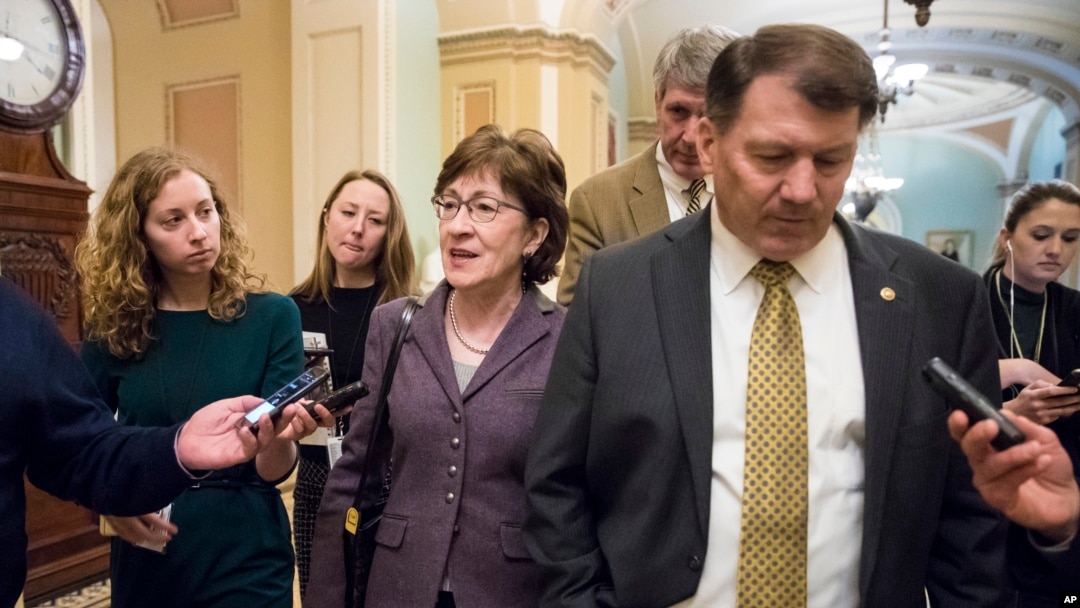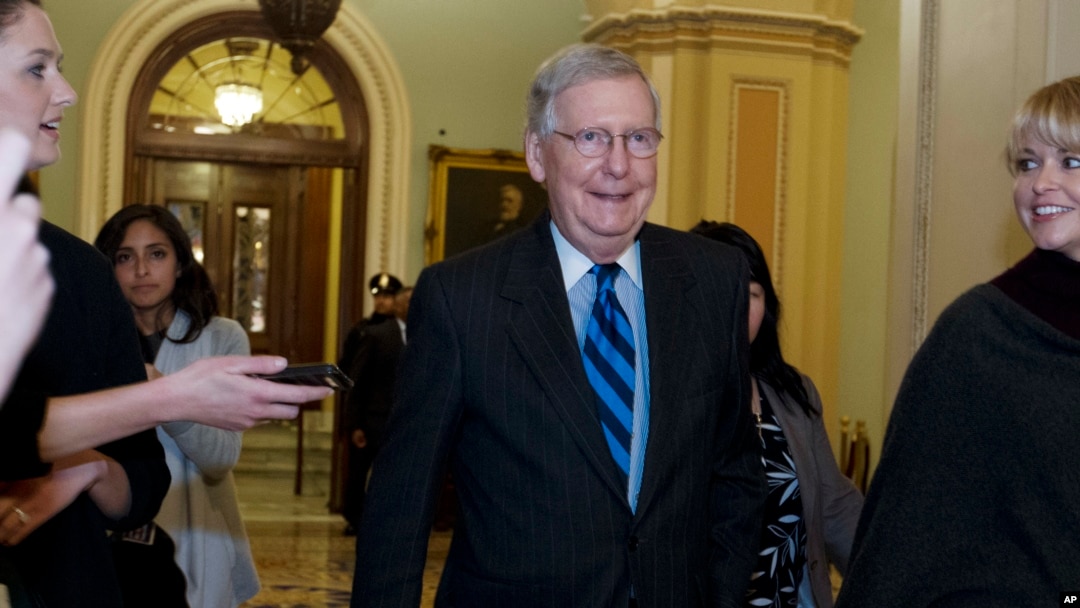Senate Republican Majority Leader Mitch McConnell has scheduled a vote at noon Monday on ending the U.S. government shutdown.
Lawmakers would be voting on a measure to fund the government for at least another three weeks.
Leaders and members from both parties spent all day Sunday meeting and negotiating and looking for a way to end the impasse on immigration which forced the government to close down.
But it is unclear exactly how much progress has been made.

Sen. Susan Collins, R-Maine, left, and Sen. Mike Rounds, R-S.D., leave a meeting in the office of Senate Majority Leader Mitch McConnell, R-Ky., as Day 2 of the federal shutdown drags on, at the Capitol in Washington, Sunday, Jan. 21, 2018.
Earlier Sunday, Maine's Susan Collins, a Republican moderate told reporters a group of 22 of her colleagues are determined to find a way out.
South Carolina Republican Lindsay Graham told reporters there needs to be what he calls an "understanding" from Republican Majority Leader Mitch McConnell that after a temporary funding bill is passed, the Senate would then tackle immigration as part of a longterm spending bill.
The House passed a budget to fund the federal government late last week.
But Senate Democrats have so far refused, demanding protection from deportation for the so-called "dreamers," young immigrants illegally brought to the United States as children.
Republicans say they will not discuss immigration until the government reopens.
Each side blames the other for the government shutdown that has suspended all but essential services because there is no authority to spend any funds.
Senate Majority Leader Mitch McConnell, R-Ky., walks to the chamber on the first morning of a government shutdown after a divided Senate rejected a funding measure last night, at the Capitol in Washington, Jan. 20, 2018.
McConnell calls the Democrats' demand for the dreamers "a political miscalculation of gargantuan proportions." He said he considers it a "non-emergency" since President Donald Trump gave Congress a March 5 deadline to find a solution to the matter.
McConnell echoed Trump by calling the standoff the "Schumer Shutdown, for Senate Minority Leader, Chuck Schumer, a Democrat.
Democrat Schumer calls it the "Trump Shutdown."
He blamed the president for agreeing to sign an immigration deal last week, then changing his mind hours later.Schumer said during at a Friday White House meeting he offered Trump a deal to fund his top immigration priority – a wall along the border with Mexico – in exchange for protection for the dreamers.
As a bitterly divided Congress moves toward a government shutdown, Senate Minority Leader Chuck Schumer, D-N.Y., center, speaks to the media outside the Capitol after meeting with President Donald Trump, Jan. 19, 2018, in Washington.
"I essentially agreed to give the president something he wanted (the wall) for something we both wanted (protection of the immigrants against deportation)" Schumer said. "He can't take yes for an answer."
Senator Graham appeared Sunday to blame the White House for the immigration standoff, specifically hardline Trump advisor Stephen Miller.
"Every time we have a proposal, it is only yanked back by staff members," Graham said Sunday. "As long as Stephen Miller is in charge of negotiation on immigration, we are going nowhere."
Graham said Miller is out of the "mainstream" with his immigration views. There has been no response so far from the White House on Graham's comments.
Trump tweeted Sunday, "Great to see how hard Republicans are fighting for our Military and Safety at the Border" with Mexico. "The Dems just want illegal immigrants to pour into our nation unchecked."
Federal agencies, meanwhile, prepared to idle employees and halt major portions of their operations if no agreement was reached Sunday or in the early hours of Monday.
A sign announcing the closure of the Statue of Liberty, due to the U.S. government shutdown, sits near the ferry dock to the Statue of Liberty at Battery Park in Manhattan, New York, Jan. 20, 2018.
The U.S. government partially shut down on several occasions over lawmaking and funding disputes. The most recent was a 16 day shutdown in 2013 in a partisan deadlock over health care policy. About 850,000 federal workers were furloughed.
Services that stop or continue during a federal shutdown varies. But federal research projects could be stalled, national parks and museums closed, tax refunds delayed, processing of veterans' disability applications delayed, and federal nutrition programs suspended, as was the case in 2013.


